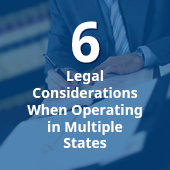 Operating a nonprofit is hard work. Between fundraising, programming, marketing, and day-to-day considerations related to fund accounting, regulatory compliance, and employment, there’s a lot on your plate. And if your organization has grown its operations beyond its home state, there are even more compliance requirements to navigate.
Operating a nonprofit is hard work. Between fundraising, programming, marketing, and day-to-day considerations related to fund accounting, regulatory compliance, and employment, there’s a lot on your plate. And if your organization has grown its operations beyond its home state, there are even more compliance requirements to navigate.
At the federal level, nonprofit compliance is relatively straightforward—you file your form 1023 with the IRS to receive 501(c)(3) status. Then, you’ll generally need to file a Form 990 each year afterward to maintain it. However, things can get complicated at the state level.
The state-level regulatory landscape is complex, with each jurisdiction having its own mix of requirements and deadlines. Nonprofits operating in multiple states must understand the wide variety of legal considerations that they’ll need to comply with on an ongoing basis. After all, the risks of non-compliance can be harsh, like damage to your reputation and even (in some cases) civil or criminal charges.
Whether you’re expanding beyond your home state’s borders for the first time or have established operations in multiple states already, it pays to do your research.
At Labyrinth, we’ve helped countless nonprofits navigate the world of state-level fundraising legal requirements for over 30 years, so we’ve seen it all— from smooth sailing to rocky non-compliance, plus constantly changing regulations. In this article, we’ve rounded the most important categories of compliance rules to keep in mind when operating in multiple states:
- Charitable Solicitation Registration
- Annual Financial Reporting
- Annual Corporate Filings
- State Tax Exemption Requirements
- Fundraising Consulting and CCV Compliance
- Fundraising Event Considerations
Your mission matters on both local and national levels. Staying compliant protects all of your hard work, safeguarding your nonprofit and showing donors and stakeholders across the country that you take your role as a steward of their support seriously. Let’s dive in.
1. Charitable Solicitation Registration
Most states (currently 41 plus the District of Columbia) require nonprofits to register as fundraising organizations before they can begin soliciting donations from residents in those states. This essentially serves as a consumer protection measure, reassuring donors that your nonprofit is a recognized and trustworthy organization.
You’re required to submit a range of different documentation with your registration application. For a breakdown of the most common documents required for this process, check out the complete Labyrinth guide to charitable solicitation registration.
The bottom line is that fundraising registration is critically important. The consequences of failing to register or renew (if required) can be severe. Aside from simply not being able to legally fundraise in those jurisdictions, you may incur late fees, other penalties, and potentially even civil or criminal charges.
State registration requirements are also extremely diverse and change constantly. This means you’ll need to stay on top of any developments taking place in the jurisdictions where you operate. To simplify the process and keep the focus on their missions, many nonprofits partner with compliance services to handle their registrations and renewals.
But even if you outsource the process to a trusted partner, you should still take steps to stay organized. We recommend creating a tidy system for tracking applications and renewal deadlines, whether digitally through your CRM, through your compliance service’s online portal, in separate spreadsheets, or even on paper—the most important thing is to stay on top of it!
2. Annual Financial Reporting
As part of the fundraising registration process, most states require one or more financial statements to be included in your initial application and regular renewals. This provides added transparency into your nonprofit’s operations.
Thankfully, for many states, this means including your most recent Form 990, which you already complete and file with the IRS annually.
However, some states have additional financial requirements—for financial audits, reviews, and/or compilations—that will need to be prepared by certified accountants. Study up on the exact financial reporting requirements that apply in the jurisdictions where your nonprofit operates, and build them into your regular budgeting and financial review process. Being prepared to provide this documentation will help ensure your registrations and renewals go through without a hitch.
3. Annual Corporate Filings
In some states, you’ll also need to register to conduct business as an incorporated organization. These states include:
- Your home state, where your nonprofit is incorporated
- States in which your nonprofit has paid staff
- A handful of states with specific requirements for corporate registration (namely North Dakota and the District of Columbia, but always take the time to double-check)
If you’re required to file corporate registration in a state, you’ll also need to appoint an on-the-ground registered agent in that jurisdiction. This individual serves as your nonprofit’s official representative, receiving tax and legal documents on your behalf.
If you have paid staff in a jurisdiction and need a registered agent, you can name them as your representative. In other cases, nonprofits may choose to use a commercial registered agent service, which provides them with dependable representation wherever they need it.
As with fundraising registration and financial reporting, the exact requirements for corporate registration can vary widely between states, so do your research to understand all of the ongoing renewal requirements that you’ll need to stick to.
4. State Tax Exemption Requirements
When operating in multiple states, you’ll also need to consider the range of tax exemption rules and regulations that come into play. Keep these key points in mind:
- In most states, your nonprofit is automatically exempt from state income taxes when you receive 501(c)(3) status from the IRS.
- However, the exact requirements to apply for and maintain this exemption can vary. Some states do require separate filings for tax exemption.
- Additionally, you may need to pay unrelated business income taxes (UBIT) and/or separately apply for state sales tax exemptions depending on the states in which you’re operating.
Nonprofit state-level tax compliance can be complicated. For instance, unrelated business activities can be defined in a variety of ways by different states. Jurisdictions may also have varying rules around sales tax exemptions for items purchased versus items sold.
Always take the time to study the rules that apply to your nonprofit—this section of the Labyrinth overview of state filing requirements can be a helpful starting point. In general, don’t hesitate to reach out to compliance or nonprofit tax experts for help; risking non-compliance isn’t worth the saved effort.
5. Fundraising Consulting and CCV Compliance
Nonprofits might turn to external partners for all kinds of fundraising support when operating in multiple states to help maintain a sustainable strategy as they expand. Executing major campaigns, researching and soliciting prospective donors, and developing strategies for securing unrestricted funding are common examples for many organizations. But when you work with outside fundraising consultants, solicitors, or other outside counsel, you’ll need to keep compliance in mind.
40 states and the District of Columbia currently require fundraising professionals to themselves be registered to operate within their borders. Due diligence means your nonprofit will need to check the compliance status of your outside counsel and, in some cases, provide states with copies of your contracts with them during your own fundraising registration and renewal process.
Additionally, many nonprofits work with commercial co-venturers (CCVs) to run fundraising campaigns, also called cause marketing. These are for-profit companies that agree to share campaign revenue with your nonprofit in exchange for using your name and logo in their promotions. A classic example is collecting small donations by rounding up totals in grocery store check-outs.
When you plan to run CCV campaigns, research your compliance requirements well in advance. These arrangements are highly regulated to head off potentially fraudulent partnerships between for-profit and nonprofit actors. Consider these essentials:
- 22 states currently have specific statutes regulating CCV partnerships.
- These statutes can control the contents of your contracts, advertisements, disclosures, and state registration filings.
- Some states also require the for-profit partner to file post charitable sales paperwork or both parties to file a joint financial report after the campaigns.
There are even more specific requirements that vary drastically by state, but the bottom line is that you and your CCV partner need to understand them in advance. Working with a compliance expert will simplify the process of navigating these rules, which is especially helpful if your nonprofit plans to run a cause marketing campaign in multiple states at once.
6. Fundraising Event Considerations
Finally, if your organization hosts or is planning to host fundraising events in different states, it’s important to review the variety of event-specific regulations that might apply in those state and municipal jurisdictions.
Since nonprofits often rely on charity auctions, raffles, and other bidding-style activities during galas to raise money for their missions, the most common event considerations to keep in mind involve games of chance. In some jurisdictions, these activities are outright banned, while others may have no requirements or require licensing for them in advance.
These activities can also be defined in different ways to include auctions, raffles, contests, and more, so double-check the requirements in state and city jurisdictions before you invest heavily in planning your event there. If you plan to serve alcohol during a fundraising event, follow the same process to review your exact compliance requirements in advance.
And don’t forget about COVID-related restrictions! Although many nonprofits are beginning to return to varying forms of in-person or hybrid-style events, state and municipal capacity and public health guidelines are still in effect in many places. These should definitely be considered whenever you begin planning a new event, as non-compliance can jeopardize not only the feasibility of your event but also your public image in the community.
Nonprofit compliance is certainly complicated, but it’s not impossible to understand. While this list of multi-state legal considerations for nonprofits isn’t exhaustive, it is a solid starting point for your research. These are the most essential pieces that you’ll need to keep in mind, but remember that the exact requirements can vary widely between states.
Big-Picture Takeaways: Always do your research early, stay up to date on changing regulations, and get help from experts. Compliance experts, accountants, and attorneys can be invaluable partners, especially if you’re ever unsure of what’s required of your organization.
 About the author
About the author
Dr. Stephen Urich is the CEO of Labyrinth, Inc., an organization that assists charitable organizations with all aspects of charity state registration and compliance. He is also a Certified Public Accountant and specializes in nonprofit accounting. He has been working in the nonprofit sector for 25 years.
